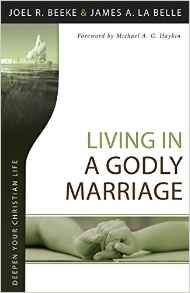
Joel R. Beeke and James A. La Belle
Reviewed by: Allen Tomlinson
Living in a Godly Marriage, by Joel R. Beeke and James A. La Belle. Reformation Heritage Books, 2016. Paperback, 268 pages, list price $15.00. Reviewed by OP pastor Allen Tomlinson.
This is one of the best books on biblical marriage that I have ever read. Some books approach the subject from a biblical perspective, and some have seemed less committed to that. Joel Beeke and James La Belle’s approach definitely belongs in the former category. One of the most beneficial qualities of this book is its balance—its biblical balance, so much needed in our postmodern culture.
As with their other jointly written books, Beeke and La Belle look to our Puritan forefathers. In this case, twenty-nine Puritan writers from the sixteenth and seventeenth centuries are quoted extensively, including Ames, Baxter, and Perkins.
There are ten chapters in the book. The first two deal with “The Institution and Honor of Marriage” and “The Purposes and Benefits of Marriage.” These chapters provide a foundation that is absolutely vital for the remaining topics.
The next two chapters are very practical, built upon the foundation laid in the first two chapters. “Securing a Good Entrance into Marriage” is one of the reasons I am going to recommend this book to all my grandchildren. “Preserving the Honor of Marriage” is very useful to all of us who are married. There is always more to learn about treating our spouses in a way that reflects God’s original purpose.
Chapters 5–9 deal with our duties toward one another, and most of all toward God, in marriage. Grounding our duties toward one another upon our duty toward God is critical for a due appreciation of them. Chapters 5 and 6, “The Mutual Duties of Love and Chastity” and “The Mutual Duties of Help and Peace,” are very helpful, even for those of us who have been “happily” married.
Chapter 10, “Concluding Counsel,” points us to Christ as the only way for us to live faithfully (in a progressive sense) in a genuinely biblical marriage. The appendix gives us “George Swinnock’s Prayers for Husbands and Wives,” and there is also a full bibliography on “Puritans on Marriage and Family.”
I have only two possible improvements to suggest. First, in regard to the creation of woman to fill up what was lacking on man (Gen. 2), the authors could have brought Titus 2:1–5 and 1 Timothy 2:11–15 into the discussion, as well as other passages that refer back to, or may be based upon, the creation account.
Second, some of the Puritans seem to personalize the Church’s marriage to Christ in a way that could lead to a dangerous kind of mysticism if one sees oneself (as an individual) as “Christ’s bride.” The bride of Christ in the New Testament is the church as the church, not the individual Christian.
However, both of these suggestions are not meant to suggest that there is a serious defect in this book. It comes highly recommended for both personal use and pastoral counseling.
March 30, 2025
On the Trail with a Missionary
March 23, 2025
Midnight Mercies: Walking with God Through Depression in Motherhood
March 16, 2025
March 09, 2025
Zwingli the Pastor: A Life in Conflict
March 02, 2025
February 23, 2025
African Heroes: Discovering Our Christian Heritage
February 16, 2025
© 2025 The Orthodox Presbyterian Church